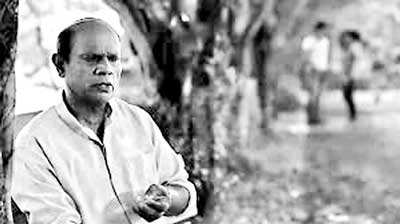Sunday Feb 22, 2026
Sunday Feb 22, 2026
Saturday, 24 June 2017 00:37 - - {{hitsCtrl.values.hits}}
Hantaneta paayana handa – Lassanaida kiyanna
Ma nodakina eh purahanda – Obata hakiya dakinna
He asks her whether the moon she sees at Hantana is beautiful and tells her that she can enjoy the full moon that he cannot see.
I was intrigued when I read ‘Hantaneta paayana handa’ as the title of the musical show by the top class vocalist Amarasiri Peiris whom I have been admiring from the time I heard him sing ‘Landune’ several years ago at one of maestro Premasiri Khemadasa’s performances at the BMICH.
I traced the Hantana song on YouTube, listened to it being sung by him with much feeling – not once but several times. It started haunting me because of its simple words, beautiful rendering and most of all, creating a picture of the days I was at Peradeniya campus.
It was only after the university moved to Peradeniya that we realised the existence of the Hantana mountain range. It quickly gained popularity. The freshers started off by climbing Hantana – with a bit of luck, getting a few female freshers to join in!
We weren’t that lucky when we did the trek. I recall how it poured that day and we got thoroughly drenched. Yet we didn’t turn back. The clothes were wet. So were the slices of bread and butter we took for lunch. When we got to the top it was totally misty and we couldn’t see the lovely view we were hoping for. However, Hantana certainly made a mark in our minds.
Back to Amarasiri’s song. Quite by accident I listened to its lyricist Dhammika Bandara, a tuition master, relating the background to the song. 
Bandara was tutoring the GCE ‘A’ level class when he noticed a boy and a girl sharing a rice and curry packet every day. After the exam, the girl came to see him to give him the good news that she had passed in all four subjects. Even before going to the university she had come and met him. For him, she was another student and soon forgot about her.
Sometime later, one day as he was walking, a van stopped and a young man wearing a tie got down and came up to him. He at once remembered that he was the boy who used to share the lunch packet. He asked him how she was faring in the university and that when he told him she had been accepted, he had given up the friendship. Bandara told him that usually it’s the other way round – the girl giving up when she goes to the campus. The boy told the teacher he felt he shouldn’t disturb her beautiful new world and that’s why he did so.
Bandara’s lyrics are so simple and touching: Don’t feel lonely as you go under her parasol when it rains. When the trees and creepers call you, don’t look the other way. Whatever thoughts you have about me, bundle them and throw into the Mahaweli. ‘Ma gana mathakaya gulikara mahaweliyata damanna’ is how the song ends.
As much as the singer and the lyricist, Danister Perera who composed the melody and provided the music deserves applause for his effort.
The song has also inspired many to create their own interpretations using the campus scenery as the backdrop – not often done for other songs. Obviously it has made such an impact.
Incidentally, I commented on ‘Hantane Sihine’ – the song sung by Pandia Amaradeva and Umaria as the theme song in a documentary on ‘The Garden University’ not so long ago.
To quote a paragraph: “It is a fascinating film and takes the viewer through beautiful Hantane hills to the greenery of the campus and a panoramic view of a mix of traditional and modern architecture in the buildings. All this with Pandit Amaradeva and young Umaria singing a duet on Hantane legends and dreams. The imaginative documentary has been conceptualised, produced and directed by a young lecturer, Dr. Madhava Meegahakumbura for the iPURSE 2014 event (the international Annual Research Sessions of the University of Peradeniya). It not only captures the beauty but the cultural and academic diversity of the university as well.”
Just as much as it was the only song that Amaradeva sang with the youthful songstress, arguably it was the last new creation sung by him.